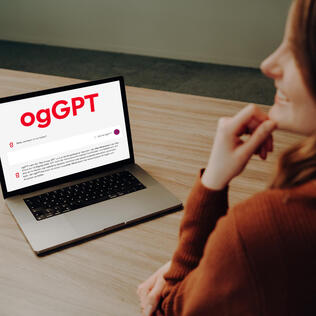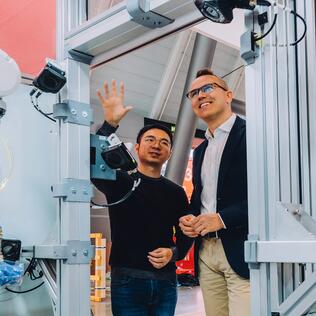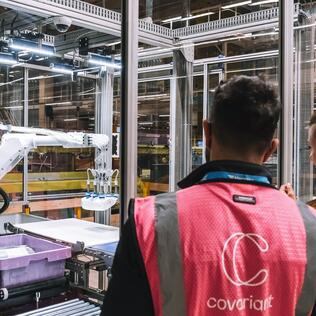A glimpse into the AI engine room: Economics minister Habeck visits the Otto Group
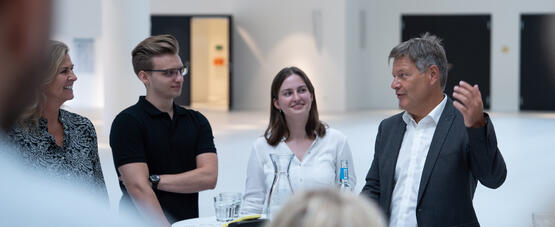
Hardly any other topic currently is subject to such intensive discussion as artificial intelligence. But it’s not just about talking, it’s also about doing. For Germany and Europe to remain competitive as a business location it is crucial to get things moving. Germany’s Federal Minister for Economic Affairs and Climate Action, Dr. Robert Habeck, has therefore been exchanging thoughts and ideas with companies and pioneers on the subject – and visited the Otto Group to do so.
AI is no stranger to the Otto Group
To gain an insight into the practical realities of AI and to better understand the challenges involved in using it, the Federal Minister for Economic Affairs and Climate Action, Dr. Robert Habeck, visited the Otto Group in Hamburg on 19 August. After all, AI has been on the Otto Group's agenda for some time now – not just since the hype surrounding ChatGPT. We have been exploiting the potential of AI for more than ten years, and OTTO alone has around 75 AI and GenAI (generative artificial intelligence) applications in operation.


His visit took in three use cases that further improve the customer experience in e-commerce, optimize processes and revolutionize logistics. He also took the time to talk to 15 apprentices and work/study students, the first generation to enter the world of work that draws on artificial intelligence.
In a highly competitive market, only those capable of reacting quickly to change, moving forward innovatively and of actively shaping the future of the industry will be around tomorrow.
Artificial intelligence in everyday working life
First, Melanie Echterhoff (Project Manager Strategy & Development) and Florian Leuerer (Expert AI & Machine Learning) presented the Otto Group’s internal, privacy-compliant AI assistant, ogGPT, which is currently available to around 27,000 employees to use in their daily work. ogGPT can be used to create summaries of documents or translations, for example, and the assistant also supports image, text and code generation as well as the creation of knowledge databases. In an internal survey, 89 percent of employees stated that ogGPT actually helps boost productivity and makes their work more enjoyable.


Automation and optimization in addressing customers
The use cases of two senior data scientists at OTTO, Thomas Keßler and Darius Morawiec, deal with individually addressing customers in the newsletter and the automated recommendation of fashion combinations on the OTTO platform. Thanks to genAI subject line automation, the six million recipients of the twice-weekly newsletter are addressed personally. An initial test revealed that this alone has brought about a 15 percent increase in the click rate, making the use of AI a real business case.
Inspiration is key in e-commerce, especially in the fashion sector which is why customers are shown over 15,000 fashion combinations on otto.de. In the past, these products were recommended manually; today, a set of AI models determines the combinations automatically and much more quickly.
Artificial intelligence and robotics
AI has practical benefits along the entire value chain, as the use cases presented by Anne Wien (Division Manager Strategic Supply Chain Projects), Malte Rehm (Senior Project Manager Supply Chain Strategy) and Katrin Pompe (Head of Innovation & Cooperation) show. Otto Group Supply Chain Management uses robotics and AI in logistics to make processes more efficient and sustainable. AI is used to make better, data-driven decisions in terms of sales forecasts and to optimize the entire supply chain. Robots from Boston Dynamics and Covariant support their human colleagues in logistics centres by automating logistics processes and performing physically strenuous and monotonous work.
More traditional companies such as the Otto Group can help establish Germany as a global market leader in the field of sustainable retail.
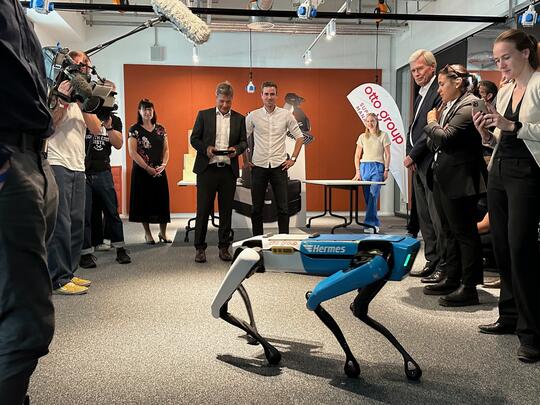

How do we design and manage artificial intelligence?
Dr. Habeck emphasized how crucial artificial intelligence is for the retail sector. He also pointed out how it needs to be shaped sustainably when it comes to quality and environmental standards: “The retail sector is facing major challenges. In a highly competitive market, only those capable of reacting quickly to change, moving forward innovatively and actively shaping the future of the industry will be around tomorrow. In order to prevent quality and environmental standards from being undercut, it is important for Germany to excel as a location based on sustainable and competitive technologies. This requires not only a forward-looking location policy, but also committed entrepreneurship. More traditional companies such as the Otto Group can help establish Germany as a global market leader in the field of sustainable retail, while opening up career prospects locally.”
Alexander Birken was delighted with the visit: “The visit by the Federal Minister for Economic Affairs and Climate Action has been an honour. I am particularly pleased that Dr. Habeck took the time to be shown various examples of the use of artificial intelligence in the Otto Group and to discuss the opportunities and challenges of this revolutionary technology with us. This is exactly what is needed to shape the future – genuine, goal-oriented cooperation between politics, business, science and other social players.”



